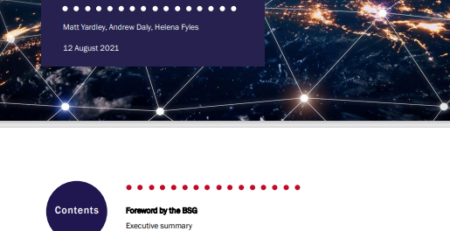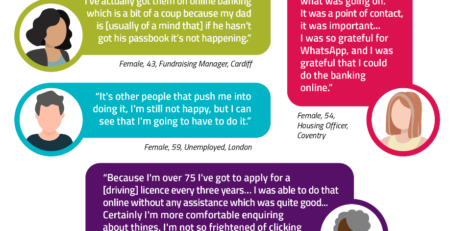Elevating the case for getting disabled people online
 Last night saw the case put to businesses from across the technology industry to engage with the accessibility agenda, hosted by our partners Intellect. The statistics are certainly compelling – half of all people who have never been online are disabled according to Go ON UK Gold’s Dan Jellinek – and if policy-makers want to get serious about furthering digital inclusion then working with the third sector and those in industry that provide systems, services and content on approaches to accessibility will be crucial.
Last night saw the case put to businesses from across the technology industry to engage with the accessibility agenda, hosted by our partners Intellect. The statistics are certainly compelling – half of all people who have never been online are disabled according to Go ON UK Gold’s Dan Jellinek – and if policy-makers want to get serious about furthering digital inclusion then working with the third sector and those in industry that provide systems, services and content on approaches to accessibility will be crucial.
As Dan stated, the London 2012 Paralympics presented a huge opportunity to attract media attention to the 4.25 million disabled people that have never been online, with Go ON UK Gold running an awareness campaign targeted at policy-makers, tech companies, disabled people and the wider public with partnership networks, web resources and video interviews. Nigel Lewis, CEO of AbilityNet and author of Mind the Digital Gap made a bold policy recommendation by asking the Chancellor to modify the tax system to create incentives for companies to make their offerings more fully accessible by default. He also called for the growing number of groups working on digital inclusion for disabled people to work together to coordinate activities and speak with one voice to policy-makers.
Kevin Carey, Chair of RNIB, lamented that technology companies all too often forget about accessibility when upgrading their software or product which can have a distressing effect on the day to day lives of disabled people. He asked of companies to go back to their teams and ask “what role does my company have in promoting accessible products???? and to look right across business operations for new answers – including engineers, public relations departments and marketing teams. Wendy Carstairs of Cisco said the dawn of the ‘internet of everything’ presented huge potential for the lives of everyone and collaboration would be key going forward.
If the third sector players in this field want to truly bring industry on board I’d make a quick observation: A more robust case on the economic contribution that accessible systems, services and content can make to the business case of these companies would go a long way to winning the less progressive companies over. Some serious modelling on demographics, ability/willingness to pay, and positive displacement of user income and so on will make industry sit up and take notice of an untapped commercial opportunity. The benefits of accessibility R&D and product development will be two-fold for business as innovations will have commercial payback for the ever growing demographic of older people who will benefit from tech that helps with physical, hearing, visual and learning difficulties.




